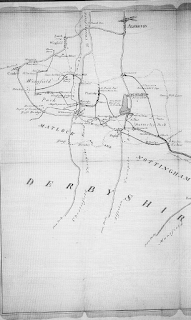 Jeremiah Brandreth, an out-of-work framework knitter known as the ‘Nottingham Captain’ and former Luddite, was now in charge of the rebellion (the ringleader, Tommy Bacon, was in hiding). Brandreth studied a map and pointed out the ‘line of march’ to his men. The rebels were to set off from South Wingfield at 10 pm, reach Pentrich by midnight, then ‘drive Butterley [the ironworks] before them’.
Jeremiah Brandreth, an out-of-work framework knitter known as the ‘Nottingham Captain’ and former Luddite, was now in charge of the rebellion (the ringleader, Tommy Bacon, was in hiding). Brandreth studied a map and pointed out the ‘line of march’ to his men. The rebels were to set off from South Wingfield at 10 pm, reach Pentrich by midnight, then ‘drive Butterley [the ironworks] before them’.They planned to steal as many arms as possible, then march to Nottingham Forest and meet another large party of rebels. Brandreth said that Sheffield and Manchester would rise at the same time. This belief in simultaneous risings elsewhere had been actively fostered by the government's spies.
At the time appointed on Monday night (9 June), Jeremiah Brandreth, George Weightman and about sixty others, some with makeshift pikes, gathered at Hunt’s Barn in South Wingfield. Brandreth was armed with a gun and pistol; Weightman was armed, too.
The rebels divided into two ‘regiments’ to gather arms and recruits; Brandreth, Isaac Ludlam (armed with a spear) and ex-soldier William Turner were in the first group. They went to peoples’ houses, hammered on their doors and demanded weapons. The men of each household were asked to
 |
| Butterley Ironworks. |
Tragedy struck when Brandreth and his men reached the home of Mrs Hepworth, a widow living with her sons. They banged on her door, but Mrs Hepworth refused to open it. The men shouted at her son William, ‘We must have your guns and your men, or we will blow your brains out’. Someone (probably Brandreth) fired through the kitchen window, and the bullet hit servant Robert Walters in the neck. He died shortly afterwards.
The rebels, about 100 in number, next went to Butterley Ironworks and tried to get in. But the works had been barricaded against them, and they left empty-handed. Some of the insurgents began to drift away. Then cavalrymen were spotted in the distance – the 15th Hussars, commanded by Captain Phillips, had been sent to investigate. The remaining rebels threw down their weapons and ran for their lives.
 |
| Letter re Brandreth and other rebels. |
The Pentrich rebellion was over.
Jeremiah Brandreth, William Turner and Isaac Ludlam were hanged for high treason at the Friar-Gate Gaol, Derby, on Friday 7 November 1817. Fourteen other rebels were transported for life. You can read genealogies of the families involved in the Pentrich Rising here.
Images: Maps showing the area of South Wingfield and Pentrich (HO42/166), and a letter from two Nottingham magistrates, Charles L Morley and J H Barber, with ‘informations’ on oath to Lord Sidmouth that they suspected Thomas Bacon, Jeremiah Brandreth, Samuel Haynes and others of ‘treasonable practices’(HO44/166/f.410).
Butterley Iron Works. Author's collection. Pictorial Gallery of Arts Vol. I, (c. 1860).

2 comments:
As a direct descendant of Jeremiah Brandreth, through his son Timothy who emigrated to America in 1850, I was impressed by your research. Thank you for your work.
Thank you! What an interesting ancestor to have - I do hope that Jeremiah's descendants settled down in their new home in America!
Post a Comment